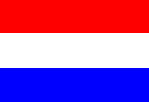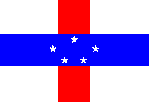
Politics

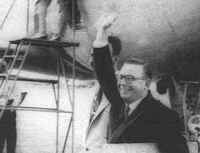
Arrival of Statuut
Colony-Country
Democracy is quite young in the Netherlands Antilles, and hardly existed before 1936 when the Colony of Curaçao was replaced by the Gebiedsdeelen Overzee and the islands got a measure of independence - just in time to be able to cope with governing problems in World War II. In 1948, the Colony of Curaçao was transformed to the Netherlands Antilles; even women got voting rights at the same time. With the general anti-colonialism feelings throughout the world and the bitter experience of the Indonesian disaster, Nederland was forced to let the former colonies go. This was done in 1954, when what remained of the former Rijksdeelen Overzee (except New Guinea) and Holland in Europe signed the Koninkrijksstatuut, which made them autonomous countries united in the Kingdom of the Netherlands: Holland, Suriname and the Nederlandse Antillen.
the Netherlands/Holland the Netherlands Antilles
The Statute
Het Statuut van het Koninkrijk der Nederlanden [The Statute of the Kingdom of the Netherlands} is not such a bad agreement at all between, at the time, three partners: The country of Holland in Europe and the former Colonies of Suriname (Dutch Guyana) and of Curaçao (which had been turned into the Netherlands Antilles already:) An autonomous country forming part of the Kingdom with its own government; all relations with foreign countries went via the Kingdom. The mere fact that a contract like that, arrived at under enormous international pressure, has now held up for half a century attests to its solidity. What remains a bit weird is why New Guinea was not invited to participate: It kept on as a mere colony and, finally, Holland had no choice but to let it go to Indonesia, in the early 1960s.
When Suriname, after a 1970s referendum, went completely independent, the Statute was maintained for the rest of the kingdom. (Forty percent of the Surinamese left for Holland, referendum or not.) Some ten years later, Aruba island opted for a status aparte; which means they got the same statute in the kingdom as (formerly) Suriname and the Netherlands Antilles. The Statute was flexible enough to stand these severe shocks.
What Went Wrong
During World War II all contact with Europe was cut off, and the Netherlands Antilles unavoidably became much more oriented on the U.S.A. and Venezuela. Still, the ties with Holland were very strong. With the Dutch flooding disaster in 1953 the Antillean people gave freely and generously, with carnival festivities cancelled for that and following years. But all this started deteriorating quickly.
For starters, the Curaçao oil and harbor boom was largely over and money started flowing back from Europe. Also, Holland had socialist governments for many years and was actively pushing the Antilles towards total independence. It was easy for Dutch politicians to grab their cut from the development funds, especially since the tradition of W.I.C. "government" in the West Indies had always been to underpay their workers, as they could augment their meager salaries from kickbacks. This led to an endemic corruption. Without the controls arranged for by the Statute being applied, corruption just grew and grew. Votes were bought quite openly. There still was plenty of money going round to get your cut once you were elected.
Finally, the general discontent became so strong that part of the Curaçao workers went on strike, with heavy rioting erupting in Willemstad.
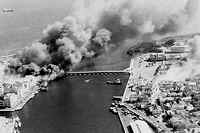
Decline and Fall
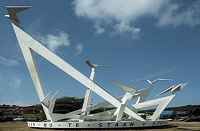
After the Referendum
Sold and Betrayed
SEARCH this site or the Web

copyright notice
all material on this site, except where noted
copyright © by , curaçao
reproduction in any form for any purpose is prohibited
without prior consent in writing
